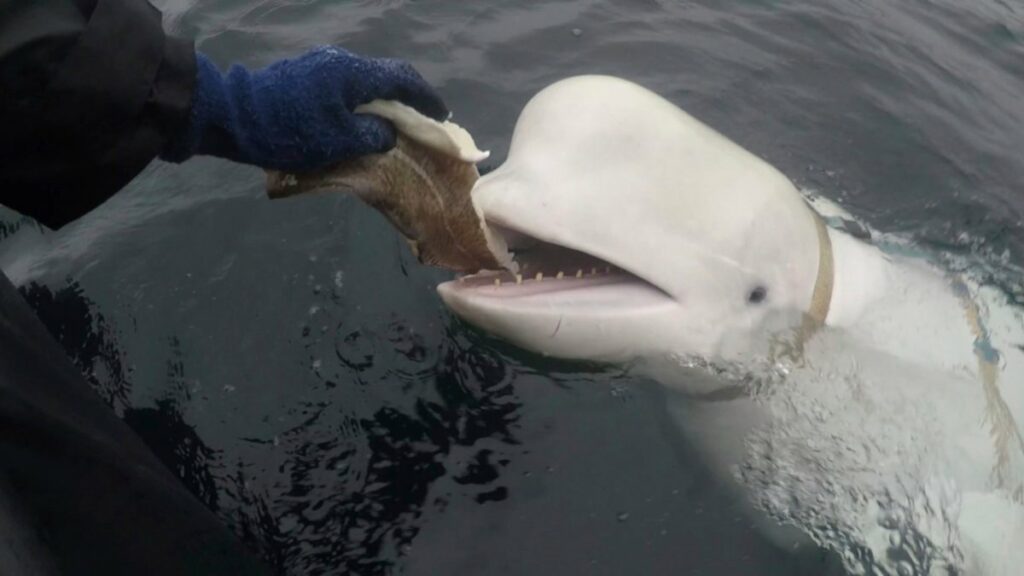A beluga whale suspected of spying for Russia after being discovered in Norwegian waters five years ago has been found dead, according to the non-profit organisation that had been monitoring it.
The body of Hvaldimir – a combination of the Norwegian word for whale and the first name of Russian President Vladimir Putin – was spotted floating in the sea by a father and son fishing in southern Norway over the weekend, Norwegian public broadcaster NRK reported.
Hvaldimir was removed from the water using a crane and taken to a nearby harbour where he will be examined by experts.
Marine biologist Sebastian Strand who worked with the NGO Marine Mind told NRK that no major external injuries were visible on the animal.
“Unfortunately, we found Hvaldimir floating in the sea,” he said.
“He has passed away, but it’s not immediately clear what the cause of death is.
“It’s absolutely horrible,“ he continued. “He was apparently in good condition as of [Friday], so we just have to figure out what might have happened here.“
In a post shared on social media, the NGO wrote that the creature “was not just a beluga whale; he was a beacon of hope, a symbol of connection, and a reminder of the deep bond between humans and the natural world”.
Who was Hvaldimir?Hvaldimir swims next to a vessel in April 2019 (Photo: Jorgen Ree Wiig/Norwegian directorate of fisheries via AP)
Hvaldimir was a beluga whale first spotted in 2019 near the island of Ingoya in the north of Norway.
These gregarious and distinctive white creatures form groups of 10 on average, with the majority residing in the Arctic Ocean and the seas and coasts around North America, Russia and Greenland.
Belugas can produce a series of chirps, clicks, whistles and squeals, which give the beluga its name, “the canary of the sea”.
Their worldwide population is believed to number around 150,000, according to the WWF.
Belugas feed on a variety of fish species, such as salmon and herring, as well as shrimp, crabs and molluscs.
A team was assembled to monitor Hvaldimir’s welfare, with the Norwegian directorate of fisheries and the police urging the public not to disturb or feed him. When he was found to be malnourished, Norwegian Orca Survey, a leading research organisation, began to feed and monitor him.
After attracting crowds of observers, Hvaldimir left Hammerfest harbour in July 2019 and was observed travelling along the Norwegian coast. It was confirmed that he was feeding himself and able to survive in the wild.
Following this, he was spotted in the waters around Sweden.
Footage was also shared online of him playing catch with a rugby ball.
Hvaldimir was found dead in the bay of Risavika, close to Stavanger, on 31 August, 2024.
Why was Hvaldimir believed to be a Russian spy?
Hvaldimir was first discovered wearing a tight harness with what appeared to be a mount for a small camera when he was first found near the island of Ingoya in Norway’s north, around 300km (190 miles) from the Russian maritime border.
The harness was stamped with “equipment of St Petersburg” in English, prompting speculation that he had been recruited for espionage purposes. Both Russia and the United States are known to have military cetacean training programmes, with Russian programmes incorporating beluga whales.
A Russian military spokesman, Colonel Viktor Baranets, said in response: “If we were using this animal for spying do you think we would attach a mobile phone number with the message ‘please call this number’?”. He did not deny that the whale might have escaped from the Russian navy, however – the Russian naval base at Murmansk is not far from where Hvaldimir was discovered.
After a fisherman removed the harness, the whale continued to return to the boats for several days, asking for food and playing fetch, and showed himself to be very tame, coming when called and liking to be scratched around the blowhole.
Hvaldimir’s interest in people, and positive responses to hand signals, led Norway’s domestic intelligence agency to presume he had been held in captivity in Russia as part of a research programme before crossing into Norwegian waters.
Read Next
Because of the Russian espionage theory, the newspaper Verdens Gang dubbed the whale Hvaldimir, a play on the first name of the Russian president and the Norwegian hval, meaning whale.
In May 2019, NRK announced that this was the winner of their public vote to name the whale, with “Joar”, for the fisherman, polling second and “Agent James Beluga” third.
Another theory posited by Morten Vikeby, a former Norwegian consul in Murmansk, suggested that Hvaldimir was a therapy animal from a programme for disabled children at the Arctic Circle Padi Dive Centre and Lodge, near the Russian-Norwegian border.
Mr Vikeby claimed that the whale may be Semyon, who was placed in the centre after being attacked by sea lions and featured in an article he wrote about the institution in 2008 for the magazine Fiskeribladet.
He suggested that the harness would be for the purpose of towing a boat with children inside, but the theory was never confirmed.
Moscow has never responded to the allegations about Hvaldimir.
Source link : http://www.bing.com/news/apiclick.aspx?ref=FexRss&aid=&tid=66d5bb0d540846108987beb0ede5308b&url=https%3A%2F%2Finews.co.uk%2Fnews%2Fhvaldimir-beluga-whale-norway-russian-spy-3256577%3Fico%3Drelated_stories&c=15624825122211685854&mkt=en-us
Author :
Publish date : 2024-09-02 01:22:00
Copyright for syndicated content belongs to the linked Source.
